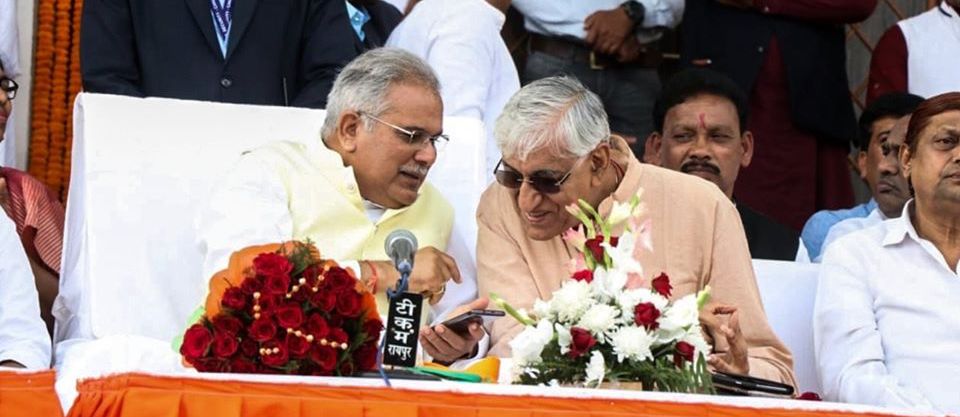
Bhopal: With elections due late next year, the Congress government in Chhattisgarh is betting on tribal voters, as evident from the Bhupesh Baghel cabinet endorsing the draft rules under the Panchayat Extension to Scheduled Areas (PESA) Act.
The Congress had promised to draft rules under the Act in 2018. In that year’s election, the Congress won 68 seats in the 90-seat strong Legislative Assembly, trumping the BJP for the first time in 15 years.
The PESA Act was enacted by parliament in 1996 to ensure self-governance for people living in Scheduled Areas. The states were required to formulate rules for the effective implementation of the Act to strengthen gram sabhas in these areas.
As per the draft rules, there will be a minimum of 50% representation for people from Scheduled Tribe (ST) communities, while Other Backward Classes, Scheduled Castes and general classes will also get representation according to their population.
After the cabinet approved the rules, Chhattisgarh panchayat minister T.S. Singh Deo tweeted, “I would like to thank chief minister Bhupesh Baghel and my cabinet colleagues for approving the draft which was prepared after discussions with the national and regional public representatives of Scheduled Tribe communities, party representatives and senior social workers during the last 2.5 years.”
Wooing ST communities?
The fulfilment of the promise by the state government to implement the PESA Act is an attempt to woo tribal communities, which constitute around 32% of the state’s population. The move has the potential to impact the Congress’s chances in 29 assembly seats.
In the 2018 assembly elections, constituencies with a sizable ST population contributed in a big way to the Congress’s sweeping victory. Of the 29 assembly seats reserved for ST members, Congress won 25. The Congress won all eight assembly seats under each of the Surguja, Raigarh and Kanker Lok Sabha seats in the 2018 polls. In Bastar, the Congress won seven assembly segments.
Therefore, the Baghel government needs to consolidate these areas if it hopes to return to power.
The BJP, on the other hand, was relegated to the opposition benches after a 15-year stint in power due to its poor performance in the ST areas. The BJP had won 11 seats reserved for STs in the 2013 previous polls and won just three in 2018.
In all likelihood, the implementation of the PESA Act is also likely to have an influence on four of the state’s 11 Lok Sabha seats – Bastar, Kanker, Sarguja and Raigad.
The BJP has historically dominated the Lok Sabha elections in the state. It won 10 of the state’s 11 seats in the 2004, 2009 and 2014 polls. The Congress was able to win just two seats in the state in the 2019 general elections, barely six months after coming to power.

Bhupesh Baghel and T.S. Singhdeo. Photo: tssinghdeosurguja/Facebook
High stakes for Baghel
The stakes are especially high for Baghel because he needs a decisive victory to cement his position as chief minister. This outcome was uncertain when he took power in December 2018. There was an unstated arrangement that Singh Deo would take over as chief minister mid-way through the five-year term.
Even a weak victory will raise questions about Baghel’s functioning and he will come under pressure not just from members of the opposition benches but from other factions of his party.
It has been widely rumoured in the corridors of the Mantralaya that rules under the PESA Act became a contentious issue for Baghel and Singh Deo. Sources close to the two leaders claimed they were both working on the draft rules. However, in the end, the panchayat department won the race and circulated the draft to other departments, including the law department.
The panchayat department begin working on the draft rules in 2020. In August 2021, the state planning commission made a special working group for PESA and with that followed several rounds of meetings with representatives of national and regional public representatives of ST communities, party representatives, senior social workers and others.
What will rules mean for Congress and ST communities?
Political observers said the PESA rules could help the Congress overcome factors like anti-incumbency. The party may consolidate SC and ST voters. Representatives of indigenous community organisations, meanwhile, feel that the move will allow people to actively participate in several development schemes.
The move will enable the development of Adivasis, said former president of the Sarv Adivasi Samaj B.P.S. Netam. In the past, the organisation held several protests to formulate rules under the PESA Act.
The endorsement of the PESA Act ensures instituting devaluation of power and strengthening of the gram sabhas at the village level. The formation of the PESA laws will give power to the gram sabhas over the management of resources like jal, jangal, zameen (water, forest and land). The spirit of the PESA Act for tribal areas under the Fifth Schedule is that rather than delegation, it devolves power and authority directly to gram sabhas and panchayats.
On February 2, 2022, Union minister of state for panchayati raj Kapil Moreshwar Patil told the Rajya Sabha the Union government has no proposal under consideration to bring about changes to the PESA Act.





